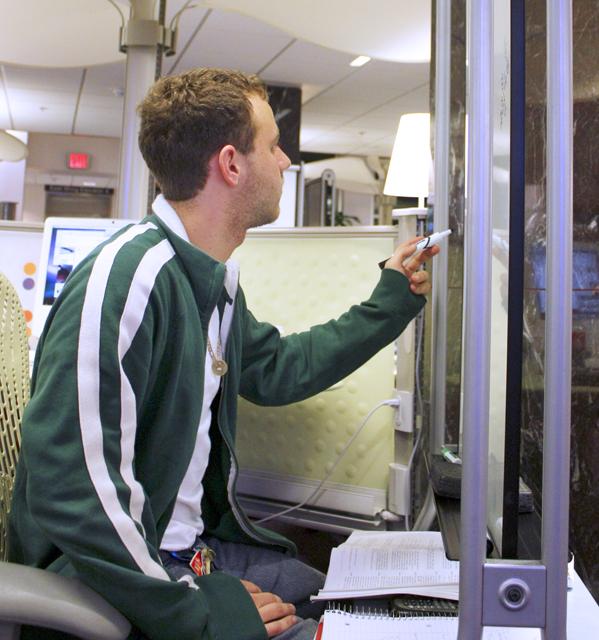
© 2009 Student Media
Matt Gromlich, senior in plant biology, studies for his Probability final exam Tuesday morning in the Learning Commons of D.H. Hill library. “Probability is definitely my hardest class,” Gromlich said. Photo by Kevin Cook.
Dead Week, the last official week of classes before exams, could be a relaxing time or a stressful time for students depending on their teachers’ expectations for the week.
According to the University’s Regulation on Tests and Examinations, faculty members may not assign tests, quizzes or new papers during the last week of classes. Projects, reports, homework and lab tests are permissible, however, as long as they were scheduled in the syllabus beforehand.
The regulation also states assignments should not have a due date during the final exam period unless they are a part of the final exam.
Vice Provost and University Registrar Louis Hunt said Dead Week was designed to make sure students know the expectations for each of their classes before the end of the semester.
“The University decided to implement a Dead Week to prevent students from getting overwhelmed in the final week of the semester and give them time to prepare for their final examinations,” Hunt said.
Jennifer Beane, a freshman in animal science, said she doesn’t see the difference between Dead Week and any other week of school.
“I have just as much work to do as always, if not more,” Beane said. “Most of my work was assigned beforehand but I’ve had so much else to do I couldn’t start on it until this week.”
Rachel Miller, a junior in communications, said to her Dead Week is not dead.
“Not all teachers acknowledge the purpose of Dead Week,” Miller said. “I personally have a couple of presentations this week and an exam. I did know about them a while ago but it’s a lot of work to do right before exams.”
Hunt said students who believe their instructors are not following the regulations for Dead Week should start by talking to their professor.
“Students will generally find that faculty are trying to help them succeed,” Hunt said. “Many of the things I have seen questioned over the years are actually permissible according to the regulation.”
Helmut Hergeth, chair of the Academic Policy Committee in the Faculty Senate, said as long as faculty members plan well they should have no reason to give exams or new assignments in the last week of classes.
“It makes sense to have due dates for long-standing projects in the last week because it gives students the maximum amount of time to work,” Hergeth said. “If we have no assignments due during Dead Week it just mean they would be due before Thanksgiving break, which would not be any easier for students.”
Not all students are unhappy with their Dead Week workload. Josh Bishop, a freshman in engineering, said he has less work to do this week than usual.
“I will have more time to study because I don’t have much work to do this week and I also have reading days,” Bishop said.
Eric Mayer, a graduate student working on MMB and MBA degrees, said Dead Week is a good idea because it gives students the chance to catch up on work and cram for exams.
“As a graduate student, Dead Week has not been as important to me,” Mayer said. “But as an undergraduate it was a good time for me to collaborate with other students and make sure I had all my work done for my classes.”
Students have questioned the regulations in the past and requested that no assignments, presentations or lab tests be allowed during Dead Week, according to Hunt.
“We have considered these requests, but changing the policy would mean everything would be due one week earlier for students, or the semester would have to be extended,” Hunt said.